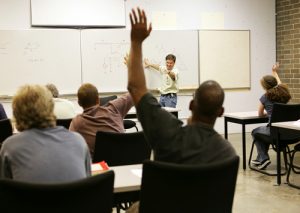
Bipartisan legislation introduced by U.S. Rep. Glenn “GT” Thompson (R-PA) to strengthen career and technical education (CTE) programs cleared the House Committee on Education and the Workforce.
The Strengthening Career and Technical Education for the 21st Century Act, H.R. 2353, would simplify the application process for federal funds, align CTE programs with in-demand jobs, and bolster transparency and accountability. The federal government’s role in the process would be limited, while the bill would empower state and local community leaders by giving them greater flexibility with using federal resources to respond to changing education needs.
The legislation, which is similar to a bill that the House approved in September on a vote of 405 to 5, was approved on Wednesday with support from U.S. Rep. Elise Stefanik (R-NY), a member of the committee and co-chair of the Congressional STEAM Caucus.
“Today, my colleagues and I voted to advance bipartisan legislation that will help many Americans obtain the education and foundational skills they need to achieve a lifetime of success,” Thompson said. “As co-chairman of the Career and Technical Education Caucus, I value the opportunity to improve workforce readiness through high-quality technical skills and remain dedicated to seeing this important bill signed into law.”
H.R. 2353, introduced with U.S. Rep. Raja Krishnamoorthi (D-IL), would build on the Carl D. Perkins Career and Technology Education Act, which provides federal support to state and local CTE programs. The bill aims to build stronger partnerships in communities, encourage more engagement among employers and streamline CTE program performance measures.
“The Perkins Career and Technical Education Act helps to equip students with the skills and experience they need to find jobs that will lead to long, fruitful careers,” Stefanik said. “This is especially important in the North Country which is home to many industries ranging from bus and train manufacturing to paper mills and a workforce that is eager for continued opportunity.”
Businesses in Stefanik’s district have a desire to find more employees who are not only technically proficient but also possess design skills found in the arts.
“As our world’s challenges become more complex employers need workers who can think outside of the box and creatively attack problems,” Stefanik said. “This holds true whether you are manufacturing a vehicle door, maintaining an automated system or designing the cockpit of a new aircraft, these skills are in demand and we need 21st Century career and technical education to train tomorrow’s workforce.”
The additional use of funds would support incorporating art and design skills training into career and technical education programs.



